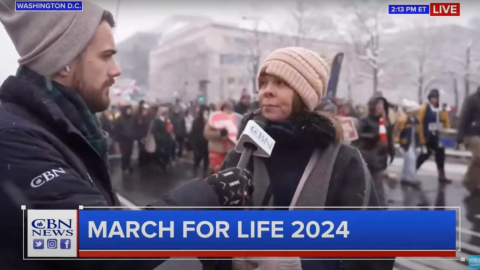
'I Did Kill My Son': Women Share Powerful Testimonies of Forgiveness After Abortions
Mixed among the thousands of Americans marching in Washington, D.C., Friday were a handful of women whose paths to the nation’s capital city were marked by the very action being protested: abortion.
Mingling among the masses were Mary and Shawna, two women who spoke with CBN News during Friday’s March for Life about the regretful choices they’d made in their respective pasts, and why it was important to each of them to march from the Washington Monument to the U.S. Supreme Court Building.
Listen to them on the latest episode of “Quick Start”
“I had an abortion when I was 18 and, at this point, I really am marching on behalf of my child, who was not born and I want women to know — and I want others to know — that there were a lot of ramifications to me after I had the abortion,” said Mary. “I thought I was taking care of a short-term problem, but really, it was not as positive as I was led to believe; it was really a very negative experience.”
Like many women, Mary said she was coerced into believing an abortion would be the right decision that would, in some way, correct the trajectory of her life.
Abby Johnson, a former executive for a clinic with Planned Parenthood, the nation’s largest abortion provider, has recounted she and others within the organization were encouraged to “sell” more than 1,000 abortions per year, because terminations are the biggest moneymaker for the business.
“Abortion is not a good thing,” Mary said Friday. “I did kill my son, and I’m sorry. I regret that. And I want other people to know that, for the inconvenience of the relatively short time of pregnancy, you can give your child life. And there are a variety of ways of taking care of that child. If you cannot, there are others who can. I’m hoping you have hope for healing if you have had an abortion.”
To those who might be considering abortion, Mary urged those women “to reconsider that” and reach out to crisis pregnancy centers instead.
Another woman, Shawna, who has had two abortions, said that, despite the overturning of Roe v. Wade, the landmark 1973 Supreme Court decision that granted nationwide legal cover to abortion, there “is still so much work to do” when it comes to protecting the unborn.
“This is my first march,” she said. “I just got healed from abortion not even two years ago. … It’s very important to still honor my child[ren], Benjamin and Grace … I was a Christian when this happened, and I really felt like God didn’t love me. I got forgiven and I got set free and I want other women and men to get set free.”
“It’s time to speak out,” Shawna continued. “I know that the Lord’s calling us at this time to do that.”
She went on to explain that she experienced significant mental health struggles in the wake of her abortions — a common outcome for many women who terminate their pregnancies.
“The emotional trauma [of abortion] was there, because it was already connected to me,” Shawna recalled of feeling the life of her unborn child end as she endured the procedure. “I would encourage people to choose life. [Abortion] will affect you at some point in your life, physically and mentally.”
“Reach out to a pregnancy center,” she added. “Talk to somebody, talk to somebody like me or other people who have been hurt by abortion.”
You can watch our full coverage of the 51st March for Life below:




